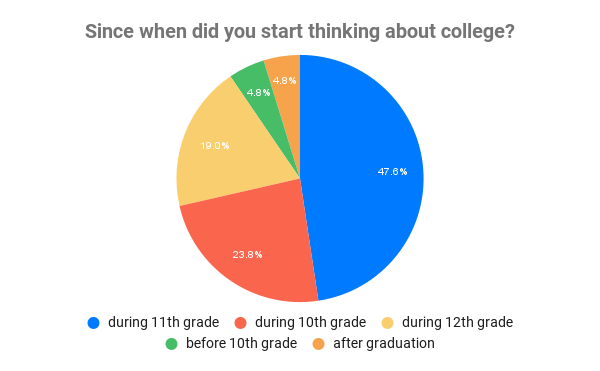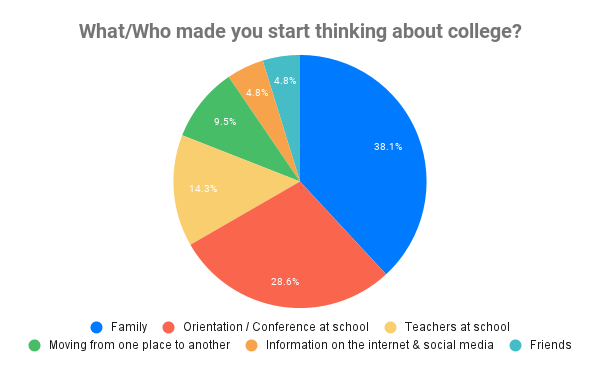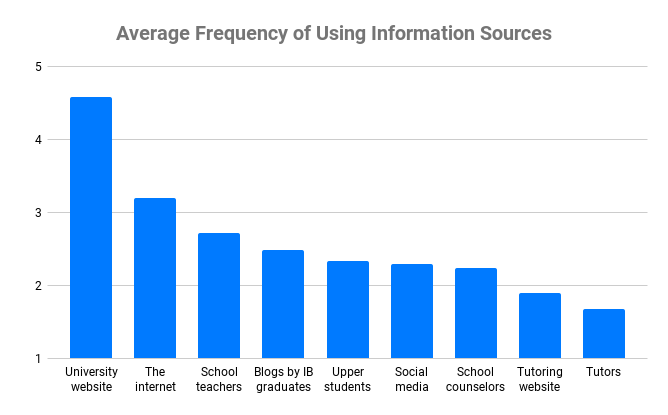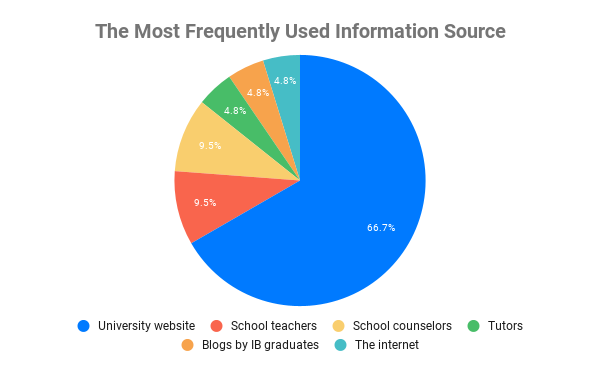One of the most stressful things to think about when you’re an IB student is choosing a university for your academic career. While having an IB diploma is an advantage in getting many more options to choose from, it also makes it harder to choose in the first place. Well, you found the right place if you are not sure about how to choose a university because we are going to tell you how IB graduates narrowed down their options.
1. When should we start thinking about college?
First off, you might wonder when your fellow students usually start thinking about college. Many IB students seem to start thinking about college when they’re in 11th grade. It makes sense because that’s the grade where IB curriculum starts and you have more opportunities to think about college in terms of time flexibility and college tour. A similar reason applies to those who started thinking about college during 10th grade, which comes as the second most popular answer. But, some people start thinking about college in 12th grade or even after graduation, so it really depends on the situation you’re in. If you have too much on your plate, then focusing on IB curriculum and your mental health might be a good option for now.

“But what made them start thinking about college?” – you might ask. It may be obvious, but talking about the future with your family seems the most common factor. Since IB school holds many school conference, career day, and career orientation with school counselors, many IB students seem to start wondering about their future, too.

2. What should we prioritize?
2.1 5 Factors to Consider
Depending on your interests and your personal situation, the factors affecting your decision in college may vary. But our original survey found out IB students take five factors into consideration on average.
Here are the five most common factors:
- Majors of students’ interest
- Application format / Entrance exam style
- School fee
- School brand / social recognition
- Location of the university
2.2 How IB Graduates Prioritized the Factors
Among the five factors, IB students prioritize one over another. The common flow of the decision-making process is shown in the pyramid below.
-1.jpg)
- If you already know what major you look for in a university, great! If not, think about what interests you right now. What do you want to learn more about? In which academic field do you feel excited to explore? Reflect on your interest and your learning attitude in classrooms by asking these questions yourself. At the same time, do some research on what kind of courses each major has for you and soon you’ll see which major has suitable academic programs. But as some IB graduates were concerned, some majors may require you to take an entrance exam or to submit a specific assignment. Make sure you have enough motivation to satisfy the requirements.
- School fees may become another major limiting factor, so make sure you check scholarship programs at each university. If you have any questions regarding scholarships, you can directly ask the administration via email.
- Famous universities have their own brand to sell their uniqueness to students and researchers around the world. If the university is well known for its historical background or academic success in the field you’re interested in, it’s more likely that they maintain a good learning environment for students. Also by being a part of the brand, many people would know what you’re doing in university and it may work as an advantage in the future. But don’t forget it’s just an “image” in society after all.
- Of course, the environment on campus is important, but the environment outside the campus also becomes a huge influence on your university life. To give a few examples, a university with a station nearby could provide easy access from home, restaurants and cafes around the campus might be attractive for foodies, and prices, in general, could affect your decision in moving from your hometown or home country. Make sure you know the university meets your standards because you will be going there every day.
2.3 Options are just options.
Although we have listed up common factors and shown an example of a decision-making process, it’s just an example after all. You might come up with personal factors that need to be taken into account or you might end up applying to more/fewer colleges than initially expected. In fact, IB graduates initially had 6.4 universities as their options on average, the actual number of colleges they applied to is 5.2.
Possible reasons for applying to more universities than expected include:
- To get insurance just in case I don’t get into my first choice.
- To use an advantage of having IB diploma that expires after 2 years.
Possible reasons for applying to fewer universities than expected include:
- Being accepted to my first choice university before applying to others.
- The entrance exam date overlapped with another university.
- Realizing I wouldn’t be able to afford the school fee even if I got into the university.
- My IB score was clearly not sufficient to get into the university.
3. Where can we get information about college?
Getting information is the key to knowing more about universities and university life in general, so let’s see where you can go to get information.

We asked IB graduates to rate each information source according to their frequency to use the source from 1 (Never used) to 5 (Always used).
According to them, university websites are the most used information source since they provide up-to-date official information about the application process, programs, and policies. You also don’t want to miss when they also announce campus tours or other official events for high school students to visit the campus.
The internet seems to be another common information source for IB students. Regardless of the accuracy of the information, there are many personal blogs, discussion rooms, web pages that provide tips and exercises, etc. It’s hard to deny the convenience of using the internet for fast access to various information.

When we asked where they went the most often to get information about the university, university website was the most popular answer and it was followed by school teachers and counselors. IB teachers and school counselors are the experts in guiding their students to universities with their knowledge and experience. Many of them are also good listeners and provide a safe space to discuss your academic future, so it’s highly recommended to ask them questions if you have any.
4. Tips from IB Graduates
Choosing a university is a life-changing decision and that might put a lot of pressure on you, but you’re not alone…! Here are some of the thoughtful tips from IB graduates for you to choose universities.
- “I think it’s important for you to choose your careers based on your aspirations. Although there might be many other good options, those should not outweigh what you really wish to do. However, it is also true to pursue a path that you really wish to pursue, so negotiations and compromise with yourself are also necessary.” – from Hope
- “What matters the most, in the end, is how much you can maximize your experience/opportunity in your university. It includes how much money you can spend doing what you want aside from residence and tuition, how accessible your campus will be, how much inclusivity is guaranteed etc.” – from Yui. N
- “Go in-depth with your research. Either talk to current students (or watch vlogs on YouTube), the university’s admission office, or other people to find out more about how the courses work, the credit system, lecture styles, and campus culture is like. (…) Depending on the school, the required courses for a major are going to differ, so if you know what you want to major in, look at the courses you have to take, the syllabi (if available), and the lecture style and see if that is what you want. Also, daily vlogs on YouTube are not always going to be accurate- everybody experiences university differently, even if it’s the same school, so take it with a grain of salt!” – from Maya F.
- “It’s best to feel the atmosphere on campus and the local area around it if you could visit the university because I personally decided on my first choice after joining the campus tour. Also, you might want to see if the environment (i.e. curriculum and people) would be suitable for you to maximize and enhance your strengths as an IB graduate.” – from s
- “(…) I’d recommend focusing on improving predicted scores because that’s how many of us apply to universities and more doors will open if you have high predicted scores. And applying to universities with IBDP takes a lot of information search, so don’t be shy to ask many teachers.” – from acorn
